Clarity,
Office 17622,
PO Box 6945,
London.
W1A 6US
United Kingdom
Phone/ Voicemail:
+44 (0)20 3287 3053 (UK)
+1 (561) 459-4758 (US).


Like a sweet-applePoem 23 in:
turning red
high
on the tip
of the topmost branch.
Forgotten by pickers.
Not forgotten—
they couldn’t reach it.
POEMS OF SAPPHO TRANSLATED BY JULIA DUBNOFF
http://www.uh.edu/~cldue/texts/sappho.html
... Charly, I love the Sapphic interpretation; it does sound like apocrypha, but regardless- do you happen to know the source for the story of Sappho casting the coins?
The way you've explained it (that the palace concubines accept Heng, but perhaps not the queen as in line 6), makes perfect sense. And anyway, sleaze is a part of life, just like murder, pregnancy, love, etc. Obviously the concubines needed to submit to Heng, to save their own lives, they had to look up to him (20).Yes, but, but… doesn’t this make line 5 sound rather sleazy? Heng isn’t keeping faith with his people, let alone his brother; also, he’s shortly to get his come-uppance at the hands of his nephew. An omen of ‘Nothing that does not bear fruit’ hardly seems to fit this story.
Thanks for this Charly, yet another I Ching image valid throughout the world and the centuries!In my defense: the uneaten fruit is even earlier than Sappho or all the preclasic chinese.
Say, as old as love.
I'm smiling at this, as I'm almost sure I never came up with any such explanation. This is all yours. This, too...The way you've explained it (that the palace concubines accept Heng, but perhaps not the queen as in line 6), makes perfect sense.
And to be clear, I think this is all good stuff, because it's always good in divination to be able to weave lines and hexagrams together and tell stories. Telling different stories means being able to think in different ways and see things that were invisible before.And anyway, sleaze is a part of life, just like murder, pregnancy, love, etc. Obviously the concubines needed to submit to Heng, to save their own lives, they had to look up to him (20).
But at least we can say that gift-giving happens, and palace people are involved – and they are almost certainly women, because not only is ‘palace people’ a traditional expression for ‘palace women’, but ‘favour’ originally implied ‘favoured and favourite concubine’.
And at line 6, ‘if the fish of line 5 represents Heng, then the uneaten fruit of line 6 must represent the consort of Yi ["but the queen has already escaped in line 3"]
Of course: ot was of my own invention.
Maybe Sappho would throw astragalous or dices or even yarrow, but the «Changes» arrived Europe in the 17th century with the Jesuits.
I couldn't agree more..the thought of the apple is brilliant!I love this - and the thought of that apple (or blackberry) - that is there but just out of reach is perfect for 23.6 brilliant....
The thought here, taken together with that in the next hexagram, shows the connection between decay
and resurrection. Fruit must decay before new seed can develop.
The sinking tendency of the hexagram is very strong. Both nuclear trigrams as well as the lower
primary trigram are K’un, whose movement is downward. In contrast with this the upper primary trigram Kên stands still, without motion. This leads to a loosening of the structure. The tendency of the five yin lines is to bring about the downfall of the yang line at the top, in that they sink down and thus take the ground from under it. Here too the fundamental trend of the Book of Changes is expressed: the light principle is represented as invincible because in its sinking it creates new life, as does a grain of wheat when it sinks into the earth.
...
THE IMAGE
The mountain rests on the earth:
The image of SPLITTING APART.
Thus those above can ensure their position
Only by giving generously to those below.
Wilhelm /Baynes, part III, H.23
HAI inherited JI’s prowess. His father was a goodly man.
Why did he end by losing his oxen and sheep in YOU-YI?
How did he win her heart by dancing with shield and plumes,
and how did she of the smooth sides and lovely skin become his paramour?
What did YOU-YI’s herdsmen say when they found them?
When they struck the bed, he had already left the chamber: how did he meet his fate?
HENG, too, inherited JI’s prowess.
How did he get back those oxherds and oxen?
How did he go about there dispensing gifts, but not return empty-handed?
Dark WEI followed in his brothers’ footsteps and the Lord of YOU-YI was stirred against him.
Why, when the birds flocked together, did she forsake her own son and give herself to him?
The Dark Man lay with her adulterously and destroyed his elder brother.
Why, after such falsehood and treachery, was it given to his posterity to flourish?
From David Hawkes' «Songs of the South»
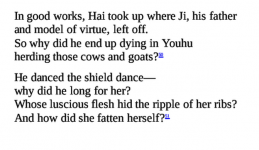
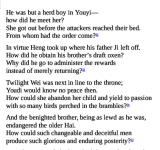
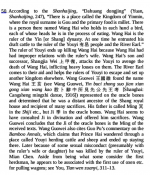
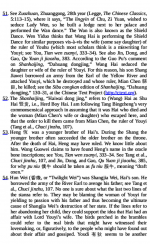
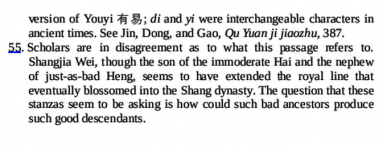
Hi Hilary:Thanks!
I would have guessed that the 'many birds perched in the brambles' were the brothers Hai and Heng, since Hai has this association with birds. (The bird totem is because they have a bird ancestor, isn't it?) The implication being that she'd sleep with anything that perched, as it were.
Hi Diamanda:What an amazing post, thanks Hilary!
The way you've explained it (that the palace concubines accept Heng, but perhaps not the queen as in line 6), makes perfect sense. And anyway, sleaze is a part of life, just like murder, pregnancy, love, etc. Obviously the concubines needed to submit to Heng, to save their own lives, they had to look up to him (20).
Thanks for this Charly, yet another I Ching image valid throughout the world and the centuries!
It is far from clear whether the palace people give or receive this favour: even RJ Lynn and ppWilhelm differ on this.
Fishes are also a metaphor for 'a good catch' of women, and they also symbolise wealth. Even in the English language there's a dating app called 'Plenty more Fish'. So maybe the I Ching is being cheeky here.the Changes is not gentle with the royal concubines, comparing them to rows of hung up fish ready to be eaten
Sounds great!The line came up for me just before the announcement of an inheritence. (receiving from someone who lived in a palace compared to my little hut)
Hi Moss:And it doesn't *exactly* matter, sort of....
(because the core pattern is a *have* , who is associated with the palace, giving to a *have not*)
but I'm inclined to believe that it is
the former...because....
marybluesky recently had this reading,
and it meant that a professor (palace inhabitant) she reached out to from her university (palace) got her a job.
The line came up for me just before the announcement of an inheritence. (receiving from someone who lived in a palace compared to my little hut)
In both cases, the querent was not an inhabitant of the palace, but received from them. Hope that is helpful.
Hi Diamanda:Fishes are also a metaphor for 'a good catch' of women, and they also symbolise wealth. Even in the English language there's a dating app called 'Plenty more Fish'. So maybe the I Ching is being cheeky here.
Sounds great!
I didn't remember how many suitors Penelope had: 108.They had all moved to her home. The home also had 50 female servants. What a huge house it must have been!
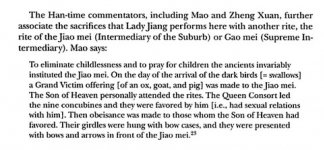 Source: David Knechtges in «Ways with Words - Writing about reading texts from early China»
Source: David Knechtges in «Ways with Words - Writing about reading texts from early China»Hi Diamanda:Fishes are also a metaphor for 'a good catch' of women, and they also symbolise wealth. Even in the English language there's a dating app called 'Plenty more Fish'. So maybe the I Ching is being cheeky here.
Anning Jing (preview available in Google Books):
(2) «To favor» and «to eat» were both euphemisms for «to have sexual intercourse».
Clarity,
Office 17622,
PO Box 6945,
London.
W1A 6US
United Kingdom
Phone/ Voicemail:
+44 (0)20 3287 3053 (UK)
+1 (561) 459-4758 (US).